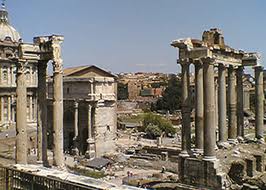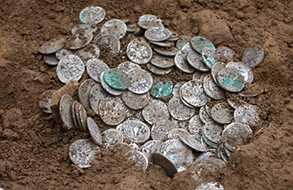|
 ......,
......, 
Roman
Coin History
Circa 509 B.C.
to 476 A.D.
The Roman Empire
was one of the greatest empires of all time. For over 1000 years
it influenced the known world through its culture and military
might. To insure its control and expansion efforts, it produced
huge amounts of money in the form of COINS. The word "money"
itself comes from the Roman (Latin) word "Moneta".
Roman imperial
coins from 1st to 4th century A.D. portray the bust of the Emperor
on the obverse side of the coin, with scenes of deities, historical
events or political messages on the reverse side.
Prior to Augustus
Caesar, Rome (Roma) was ruled by the Senate and was considered
a Republic. Coins of this time period featured "gods and
goddesses" that were important to the Roman people, as well
as, scenes that depicted important battles, or events. Each "god
or goddess" had their sphere of domain and influence. *(See
Mythology)
Roman coins were
made of gold, silver, bronze or some combination thereof. Many
of the coins were newly minted before being buried some 1500 to
2000 years ago, and have been well cared for since recovery. Personal
ownership and enjoyment of these historical ancient artifacts
(in very fine condition) is possible because of the large numbers
produced and preserved.
|